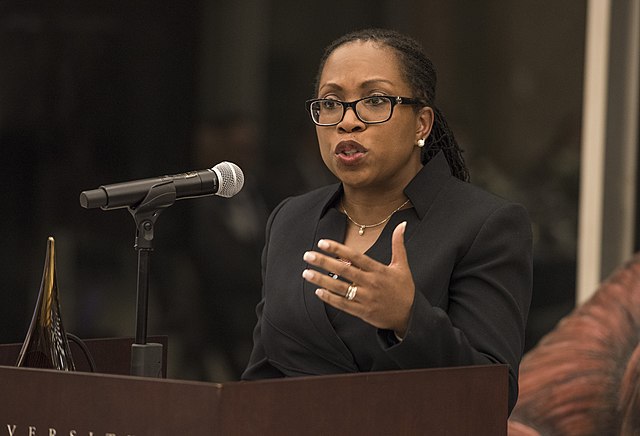Ketanji Brown Jackson’s Supreme Court nomination historic, long overdue
Lloyd DeGrane (Wikimedia Commons)
Judge Ketanji Brown Jackson was nominated to the United States Supreme Court on Friday by President Joe Biden, who fulfilled his campaign promise of nominating the first black woman to the court.
February 26, 2022
After a monthlong search, President Joe Biden nominated Judge Ketanji Brown Jackson to replace retiring Justice Stephen Breyer on the United States Supreme Court. Breyer’s retirement from the court on Jan. 26 gave Biden his first opportunity to nominate a justice to the Supreme Court and fulfill his campaign promise of nominating a black woman.
If confirmed, Brown Jackson would make history by becoming the first black woman to serve on the court. Biden’s nomination is a historic and long overdue move which best represents a changing American society.
“For too long our government, our courts, haven’t looked like America,” Biden said in remarks delivered Friday, two years to the day that he first made the promise to nominate a black woman to the Supreme Court. “I believe it is time that we have a court that reflects the full talent and greatness of our nation.”
In Judge Jackson, 51, Biden makes a much-needed appointment that brings necessary diversity to a court which for the longest time has not truly represented the American people. Throughout history, the Supreme Court has been dominated by white, upper-class males, with only a few women being nominated in the past few years, none of whom were black.
For a court that is ruling on cases which significantly affect the American people and change the course of history, this overall lack of minority representation is worrying, as America is an extremely diverse country with dozens of nationalities which aren’t being accounted for in decisions made on the court. However, with the appointment of Judge Jackson, Biden has made an important step towards reversing the trend of appointing white male justices to the Court and creating a court that is more representative of the American people.
Though Biden nominated Jackson to the Court, she still must be confirmed in a majority vote in the Senate, which won’t be easy due to the hyper-partisan and extremist nature of our current government. It is likely that no Republican Senators will vote to confirm Jackson, just as no Democratic Senators voted to confirm Donald Trump’s last nominee to the court, Justice Amy Coney Barrett. This means that the Democrats must keep all of their votes in the Senate if they want Jackson to be confirmed as a justice.
Democrats and Republicans must stop looking at Biden’s nomination of Judge Jackson along party lines and instead look at if she will make a good justice and if she will be a worthy replacement for Stephen Breyer, which her career so far says she will be. Jackson clerked for Breyer when she was coming out of law school and has followed that up with an illustrious legal career that includes most recently serving on the United States District Court of Appeals for the District of Columbia. Her rulings tend to be centrist, leaning liberal, which is beneficial to the court, as it will help to bridge the hyper-partisanship which is beginning to form between justices appointed by different Democratic and Republican presidents.
At this point in time, though all of the other candidates on Biden’s shortlist were extremely well qualified, Judge Jackson is the right choice to nominate to the Supreme Court. As well as helping to diversify the court and alleviate the ever-increasing hyper-partisanship, Jackson is also extremely qualified, having served on federal courts for longer than several of the current justices had when they were appointed. Her nomination and impending confirmation is a crucial next step in helping American society move forward, and she is bound to be an important figure in American politics for decades to come.













